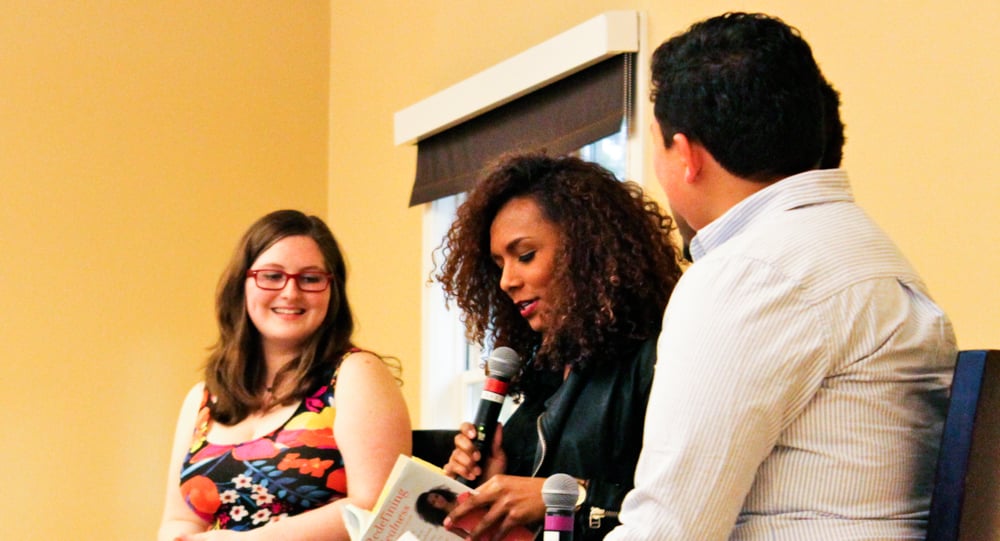
On April 18, more than one hundred people gathered outside the Black Community Services Center to hear Janet Mock — The New York Times best-selling author of the memoir “Redefining Realness: My Path to Womanhood, Identity, Love & So Much More” — speak about what it means to be transgender.
According to Mock, her book was primarily influenced by Maya Angelou’s “When the Caged Bird Sings,” which discusses issues like sexual abuse.
“This idea of realness is a sense of survival as you are already a person of color and then you add the trans part,” Mock said.
Mock explained that she did not write the memoir for herself and did not intend the book to be something as simplistic as a voice of the voiceless.
“I wanted my target audience to be younger girls — to give them language and let them know they’re not alone,” Mock said. “My goal wasn’t to educate, but by centering that young, poor trans girl of color, we centralize everyone else…Everyone else can choose to understand.”
As she was developing her female identity, one of Mock’s role models was Beyoncé Knowles. For Mock, Beyoncé was a form of validation — “the epitome of a graceful, strong, beautiful woman.” Mock’s anecdote about her mother showing support of Beyoncé by going to the grocery store and picking up magazines with Beyoncé on the cover even elicited laughter from the audience.
Mock said that she made her pivotal decision to embark on her journey to womanhood towards the start of the millennium.
“With the limited time I had left, I wanted to be fully me,” Mock said. “I had this internal angst about my body. I made a decision to engage in the sex trade full time to afford the medical things I would need.”
Mock said that she felt a sense of responsibility to become an advocate for change as a member of the transgender community. With her education, training, appearance and articulation, she was able to work closely with a publisher to use her memoir as a way to emerge from survivor’s guilt.
Mock experienced racism and classism after leaving Honolulu, her childhood home, for New York University, and Stanford students in the audience said that her stories resonated with them.
After seeing her speak at Stanford in spring of 2013 for the first time, Kevin Roberts ‘13, president of Black and Queer at Stanford, expressed enthusiasm about having Mock back as a speaker again this year.
“She’s a great person to bring because she inhabits her identity in a way that I think many queer people of color have learned to prior to Stanford but may not yet have it sutured in this very privileged, very white supremacist space,” Roberts said.
According to Violet Trachtenberg ‘16, president of SSQL, their organization invited Mock as a keynote speaker in last spring and received a strong, positive reaction from students. Trachtenberg described this year’s turnout as even more inspiring.
“For me, what’s most empowering is seeing Black House fill up with people who want to come see a poor, mixed, black indigenous trans woman who is proud about all of these things,” Trachtenberg said.
Audience member Keagan Sitompul ‘17 shared his admiration for Mock.
“Janet Mock carried the room with the grace of somebody who has come out of her journey through womanhood a strong and powerful woman,” Sitompul said. “She was accessible but subtle, cheeky but never crass. She was everything.”
Black and Queer at Stanford (BlaQs) cosponsored the event in collaboration with Stanford Students for Queer Liberation (SSQL), the First-generation Low Income Partnership (FLIP), La Familia de Stanford, QuEST and the Black Community Services Center.
Contact Angelique Dakkak at angeldak ‘at’ stanford ‘dot’ edu.